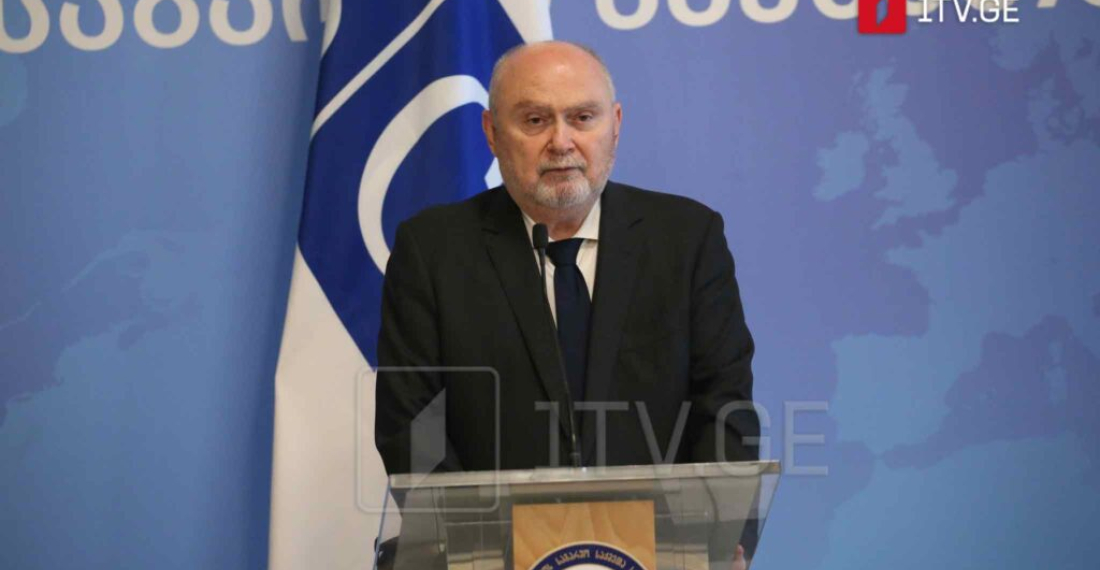The Organisation for Security and Co-operation in Europe’s (OSCE) Secretary General Feridun Sinirlioğlu is in Tbilisi this week, in his first visit since the October parliamentary elections widely seen as flawed. The OSCE/ODIHR’s own observer mission had criticised the government’s handling of the October 2024 elections. On Wednesday, Sinirlioğlu met with the Prime Minister Irakli Kobakhidze.
According to the Georgian government, the meeting focused on cooperation with the OSCE, the current situation in the region, and ‘the challenges facing Georgia’. ‘The Prime Minister thanked the OSCE Secretary General for visiting Georgia and maintaining close cooperation’, the statement said, adding that they discussed the current situation in Abkhazia and South Ossetia.
‘Special attention in the meeting at the government administration was paid to the importance of peace and stability in the South Caucasus region, and Georgia’s efforts to this end. As it was pointed out, it is important that the OSCE remain the key platform for dialogue on the architecture of European security’, the government stated.
Sinirlioğlu’s visit to Georgia comes during a long political crisis which follows October’s parliamentary elections. According to official results, Georgian Dream secured a large majority, with 54% of the vote.
On Wednesday, Sinirlioğlu also met with representatives of the Georgian Central Election Commission (CEC), the chair of the commission, Giorgi Kalandarishvili, and his deputy, Giorgi Sharabidze. According to the CEC statement, Kalandarishvili ‘delivered a detailed overview of the 26 October parliamentary elections and the large-scale implementation of electronic technologies. Existing challenges of the mentioned elections were also discussed at the meeting’.
According to the statement, upcoming municipal elections scheduled on 4 October ‘were also a key topic of discussion during the meeting’.
On 18 April, US Congressperson Joe Wilson, who is also the co-chair of the Helsinki Commission, urged Sinirlioğlu to refrain from visiting Georgia. In a letter published on X, Wilson stated ‘any visits to the illegitimate [Bidzina] Ivanishvili regime would only be misrepresented as an endorsement of their tyrannical takeover. We must stand with the Georgian people!’
On his first day of the visit, on Tuesday, Sinirlioğlu held his first meeting with Foreign Minister Maka Botchorishvili. The main points he expressed at the joint briefing were related to the stability of the region and the resolution of conflicts through dialogue.
Sinirlioğlu stated that the OSCE supports both Georgia and all other countries in the region. ‘The OSCE Secretary General’s Visit to Georgia is a significant message and a step forward’, Botchorishvili said. According to the Georgian Foreign Ministry statement, during the meeting, they reviewed the current situation in the region and ‘the challenges facing Georgia’.
‘Particular attention was drawn to the fact that two regions of Georgia, Abkhazia and Tskhinvali (South Ossetia), remain under Russian occupation, thus violating the country’s territorial integrity’, the statement read.
The statement said that the meeting also focused in particular on ensuring peace and stability in the South Caucasus. ‘The Minister highlighted Georgia’s active role in this regard, including the recent trilateral meeting hosted in Tbilisi between the foreign ministries of Georgia, Azerbaijan, and Armenia’.
Sinirlioğlu also visited the village of Odzisi, near the Administrative Boundary Line (ABL) between Georgia and South Ossetia. On 20 December 2024, the OSCE/ODIHR issued its final report on the 26 October parliamentary elections.
In a press release, the OSCE noted that concerns regarding the impact of recently adopted legislation on fundamental freedoms and civil society, steps to reduce the independence of institutions involved in the electoral process, and pressure on voters together with election-day practices, ‘limited the ability of some voters to vote without fear of retribution’.
The OSCE also said the observer mission ‘does not recognise or endorse elections’ but ‘provides a comprehensive and impartial assessment of the electoral process based on universal principles, international obligations, and the commitments to hold democratic elections made by all OSCE states’.
Levan Sanikidze, a member of the opposition group Unity National Movement, said, ‘it would be better if this visit did not happen’.







